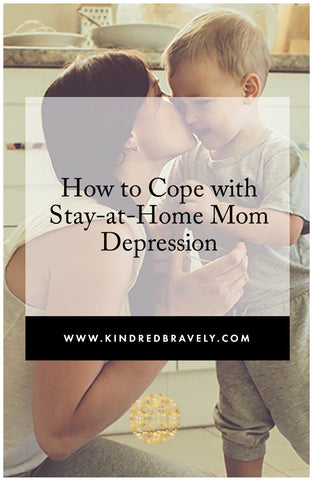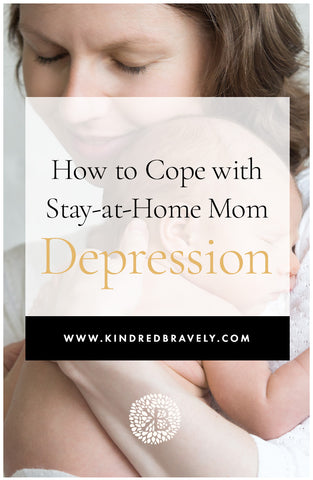When we begin our journeys as stay-at-home moms (SAHMs), reality may not match our expectations. We’re thankful we get to be there for so many magical moments of our kids’ childhoods, and we want to care for them each step of the way. But being a stay-at-home mom can also be overwhelming and relentless, leaving some moms feeling sad, defeated, and even resentful.
While it’s a privilege to spend so much time with our kids, that doesn’t make it any less challenging. SAHM depression is a real thing that many of us face, and it’s time we have a candid discussion about it.
What Is SAHM Depression?

The depression that some SAHMs experience shouldn’t be confused with postpartum depression (PPD), a mental health disorder that affects 1 in 7 moms. Although PPD can last for months if left untreated, it’s usually limited to the postpartum period, whereas SAHM depression can strike at any time.
How do you know if you’re experiencing depression and not just loneliness or the blues? According to the American Psychiatric Association, symptoms of depression include sadness, hopelessness, loss of appetite, and not wanting to engage in activities you previously enjoyed. You may be diagnosed with depression if these symptoms last two weeks or more.
Symptoms of depression can range from mild to serious and may include suicidal thoughts or thoughts of self-harm. If you have any concerning symptoms of depression, contact your health care provider as soon as possible; if you’re having thoughts of suicide, immediately call 911 or go to the emergency room.
How Common Is SAHM Depression?

According to a 2012 Gallup poll, 28% of mothers experience depression related to staying home with their kids and are much more likely to be diagnosed with depression than moms who work outside the home. (Stay-at-home dads experience depression too, but most of the research is about SAHMs.)
It’s no wonder so many SAHMs are stressed out. Studies show that SAHMs work the equivalent of 2.5 full-time jobs! And it’s not just the long hours, feeding, cleaning, scheduling, diaper changes, tantrums, and sleepless nights that are challenging – it’s the fact that SAHMs often do all of that with very little support.
How to Cope with SAHM Depression
It’s hard to make time for the self-care required to address SAHM depression. And there’s often some guilt involved in putting yourself first – it’s not something moms are used to. But the truth is, if you aren’t well, you may not be able to be the mom you want to be for your kids.
Here are some ways to start coping with SAHM depression:
1. Write about it.

Writing down your thoughts and feelings is a great first step toward healing. In fact, many moms share their struggles with being an SAHM on a blog or through social media. Rita, a mom from Ohio, started blogging to process her struggles with SAHM depression. “I wanted to connect with other moms, so I just started writing candidly about it on the internet in hopes that I’d find people who understood this weird season of my life,” she shares. She now writes and edits parenting blogs for a living.
2. Connect with other SAHMs.

There is a mom support group out there for everyone: breastfeeding support groups, mommy-and-me classes, babywearing groups, and exercise clubs are all good bets. Online mom groups are especially great during this period.
3. Make naptime and evenings for YOU.

This is a hard one, as it’s so tempting to dedicate your kids’ naptimes or those precious evening hours to cleaning or taking care of other chores. But try to dedicate at least an hour or two a day to yourself – even if that just means watching TV, taking a bath, or going for a walk.
4. Reach out to a therapist or counselor.

Some of us experience SAHM depression as a few weeks of depression symptoms; for others, it can become chronic. A good therapist is worth their weight in gold, and if you’re experiencing clinical depression (two or more weeks of serious depression), consider contacting a therapist (many therapists offer virtual/telemedicine sessions). Your health insurance may cover therapy; if not, many community health centers offer free or reduced-fee counselors. The Anxiety and Depression Association of America has some great tips on how to find a low-cost therapist.
5. Get your sweat on.

Exercise is a natural mood booster. Many yoga studios and fitness apps are offering free and low-cost online workouts you can do at home. If you’re able, strap your baby into a carrier or a stroller and go for a walk. Some moms fit in solo exercise during the early morning hours, at naptime, or in the evening. “It took a few false starts, but once I found a running group for moms and connected with the women there, things really turned around. I felt better physically and mentally,” says Shana, a mom from Maryland.
6. Catch up on your sleep.

Sleep deprivation can have a profound effect on your mental health, and many moms are chronically sleep-deprived. It can feel virtually impossible to get enough sleep, especially if you have young kids who wake up at night or super early in the morning.
Communicating your needs is so important. If you have a partner, have a candid conversation about what you can do so you can sleep more. If you’re a single parent, consider asking friends and family to babysit your kids so you can nap (once social distancing is over). We mamas have to do whatever necessary to catch up on sleep, and when you’re battling depression, sleep is a priority.
7. Have realistic expectations,
and try to keep things in perspective.

Your little ones won’t always be this demanding, and the hardest years of motherhood go by faster than you might realize. “I'm trying to embrace the fact that this is a temporary season of life,” says Carrie, a mom from Colorado. Carrie also shares that she’s learned to embrace all her feelings about motherhood – even the most difficult ones. “You can love your kids and still struggle being at home all the time … these things are not mutually exclusive.”
Being a stay-at-home mom isn’t always sunshine and roses, and that’s okay. We need to start talking about this, admitting how hard it can be, and knowing that it’s healthy for us to look for ways to lighten the load and focus on our own needs every once in a while. After all, you can’t pour from an empty cup.
If your depression is making you feel unable to function or enjoy your life, please reach out to your health care provider right away. And remember that you are braver than you can even imagine.






